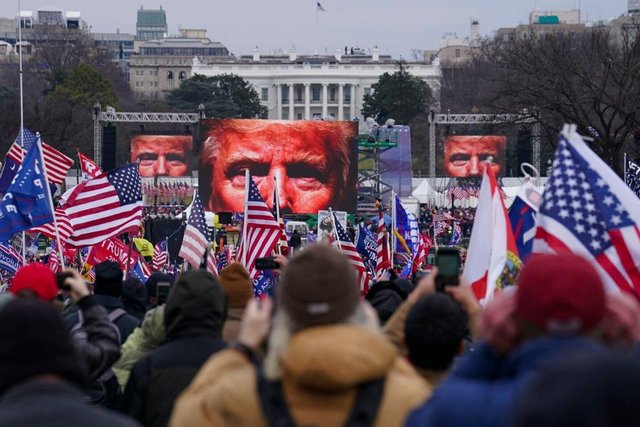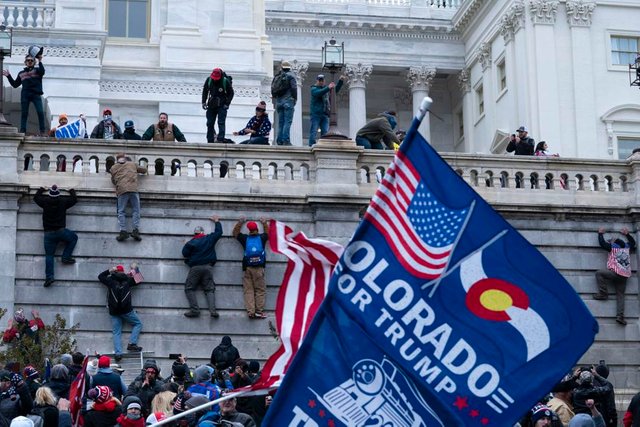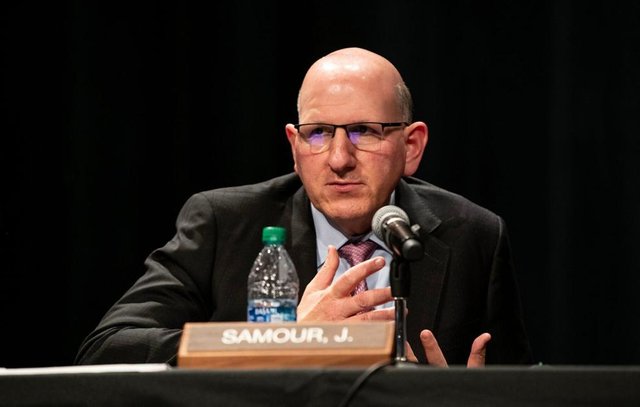coloradopolitics.com
US Supreme Court rules Colorado cannot remove Trump from ballot
The Supreme Court did not address the conclusion of Colorado courts that Donald Trump engaged in insurrection as president

Donald Trump supporters participate in a rally in Washington, Jan. 6, 2021, that some blame for fueling the attack on the U.S. Capitol.
associated press file
Facebook
Twitter
WhatsApp
SMS
The U.S. Supreme Court on Monday unanimously told Colorado it could not use its election laws and judiciary to disqualify Donald Trump from the presidential primary ballot, overturning a contrary decision by the state Supreme Court from December.
While the unsigned majority opinion concluded states may not remove presidential candidates absent congressional authorization, the justices did not address the conclusion from Colorado's state courts that Trump engaged in insurrection.
The decision arrived weeks after oral arguments and fewer than 48 hours before voting ends in Colorado's March 5 primary. Although Trump's name remained on the state's ballot, it was an open question what would happen with votes cast for Trump in the event the nation's highest court found him ineligible to hold office.
BIG WIN FOR AMERICA!!!" Trump wrote on his social media platform, Truth Social.
The Colorado Republican Party, a party to the lawsuit, also cheered Trump's victory on social media platform X: "Joe Biden and his crooked allies don’t get to engage in election interference by violating our right to vote for the candidate of our choice. On to November!"
Citizens for Responsibility and Ethics in Washington, the group that backed the litigation, maintained the ruling was not a victory for Trump.
"While the Supreme Court allowed Donald Trump back on the ballot on technical legal grounds, this was in no way a win for Trump. The Supreme Court had the opportunity in this case to exonerate Trump, and they chose not to do so," said Noah Bookbinder, president of CREW. "Every court — or decision-making body — that has substantively examined the issue has determined that January 6th was an insurrection and that Donald Trump incited it. That remains true today."
The case originated in Colorado after four Republican and two unaffiliated voters petitioned to force Secretary of State Jena Griswold to bar Trump from the ballot under state elections law. The petitioners alleged Trump was ineligible to hold office under Section 3 of the 14th Amendment, which was ratified in the wake of the Civil War.
The Colorado Supreme Court, by 4-3, agreed with them and declared Trump constitutionally ineligible late last year.

In this file photo, supporters of President Donald Trump climb the west wall of the the U.S. Capitol on Jan. 6, 2021, in Washington.
(AP Photo/Jose Luis Magana)
On appeal, the U.S. Supreme Court issued three opinions, all reaching the ultimate conclusion that Colorado could not disqualify Trump.
The majority opinion from Chief Justice John G. Roberts Jr. and Justices Clarence Thomas, Samuel A. Alito Jr., Neil M. Gorsuch and Brett M. Kavanaugh — all of whom are Republican appointees — concluded states may disqualify candidates from state office only. For federal offices, and "especially the Presidency," the majority believed there would be logistical problems from a potential "patchwork" of state-driven disqualifications.
Two concurring opinions disagreed with the majority's reliance on Congress to enforce constitutional disqualifications.
Justice Amy Coney Barrett, a Trump appointee, wrote separately to agree states may not enforce Section 3 against presidential candidates, but stopped short of endorsing the idea that Congress alone could act to do so. She did not describe how else a presidential candidate might be disqualified for insurrection, but argued that, in the middle of an election, the Supreme Court's opinions should "turn the national temperature down, not up."
The court's three Democratic appointees — Justices Sonia Sotomayor, Elena Kagan and Ketanji Brown Jackson — also wrote separately to dispute that only Congress can act to remove insurrectionist candidates from office. They pointed out Section 3 explicitly allows Congress, by a two-thirds vote, to reverse a candidate's disqualification, but says nothing about who disqualifies in the first place.
"It is hard to understand why the Constitution would require a congressional supermajority to remove a disqualification if a simple majority could nullify Section 3’s operation," the justices wrote, by "declining to pass implementing legislation."
Griswold, in a statement, said the Supreme Court "has ruled that states do not have the authority to enforce Section 3 of the 14th Amendment for federal candidates. In accordance with this decision, Donald Trump is an eligible candidate on Colorado’s 2024 Presidential Primary."

Colorado Supreme Court Justice Carlos A. Samour Jr. speaks to students at Pine Creek High School during a Courts in the Community event in Colorado Springs on Thursday, Nov. 17, 2022. (The Gazette, Parker Seibold)
Parker Seibold
Dissent from Colorado's Samour came closest
With all three opinions totaling just 20 pages, the justices made little reference to the work of their counterparts in Colorado.
SHARE THIS
Facebook
Twitter
WhatsApp
SMS
Email
Next Up
NEXT UP
Judge's drinking problems reportedly at core of discipline case; colleagues knew, but never reported it
Judge's drinking problems reportedly at core of discipline c…
US Supreme Court rules Colorado cannot remove Trump from ballot
The Supreme Court did not address the conclusion of Colorado courts that Donald Trump engaged in insurrection as president
Michael Karlik [email protected] Mar 4, 2024 Updated 3 hrs ago
Election 2024 Trump Insurrection Amendment Explainer
Donald Trump supporters participate in a rally in Washington, Jan. 6, 2021, that some blame for fueling the attack on the U.S. Capitol.
associated press file
Facebook
Twitter
WhatsApp
SMS
Email
Copy article link
The U.S. Supreme Court on Monday unanimously told Colorado it could not use its election laws and judiciary to disqualify Donald Trump from the presidential primary ballot, overturning a contrary decision by the state Supreme Court from December.
While the unsigned majority opinion concluded states may not remove presidential candidates absent congressional authorization, the justices did not address the conclusion from Colorado's state courts that Trump engaged in insurrection.
The decision arrived weeks after oral arguments and fewer than 48 hours before voting ends in Colorado's March 5 primary. Although Trump's name remained on the state's ballot, it was an open question what would happen with votes cast for Trump in the event the nation's highest court found him ineligible to hold office.
"BIG WIN FOR AMERICA!!!" Trump wrote on his social media platform, Truth Social.
The Colorado Republican Party, a party to the lawsuit, also cheered Trump's victory on social media platform X: "Joe Biden and his crooked allies don’t get to engage in election interference by violating our right to vote for the candidate of our choice. On to November!"
Citizens for Responsibility and Ethics in Washington, the group that backed the litigation, maintained the ruling was not a victory for Trump.
"While the Supreme Court allowed Donald Trump back on the ballot on technical legal grounds, this was in no way a win for Trump. The Supreme Court had the opportunity in this case to exonerate Trump, and they chose not to do so," said Noah Bookbinder, president of CREW. "Every court — or decision-making body — that has substantively examined the issue has determined that January 6th was an insurrection and that Donald Trump incited it. That remains true today."
The case originated in Colorado after four Republican and two unaffiliated voters petitioned to force Secretary of State Jena Griswold to bar Trump from the ballot under state elections law. The petitioners alleged Trump was ineligible to hold office under Section 3 of the 14th Amendment, which was ratified in the wake of the Civil War.
Section 3 disqualifies senators, U.S. representatives and "an officer of the United States," among others, from holding future office if they took an oath to support the Constitution and subsequently "engaged in insurrection." The Colorado petitioners argued Trump's attempt to overturn the 2020 election results and disrupt the certification of President Joe Biden's victory on Jan. 6, 2021 amounted to engaging in insurrection.
The Colorado Supreme Court, by 4-3, agreed with them and declared Trump constitutionally ineligible late last year.
Electoral College Protests
In this file photo, supporters of President Donald Trump climb the west wall of the the U.S. Capitol on Jan. 6, 2021, in Washington.
(AP Photo/Jose Luis Magana)
On appeal, the U.S. Supreme Court issued three opinions, all reaching the ultimate conclusion that Colorado could not disqualify Trump.
The majority opinion from Chief Justice John G. Roberts Jr. and Justices Clarence Thomas, Samuel A. Alito Jr., Neil M. Gorsuch and Brett M. Kavanaugh — all of whom are Republican appointees — concluded states may disqualify candidates from state office only. For federal offices, and "especially the Presidency," the majority believed there would be logistical problems from a potential "patchwork" of state-driven disqualifications.
Two concurring opinions disagreed with the majority's reliance on Congress to enforce constitutional disqualifications.
Justice Amy Coney Barrett, a Trump appointee, wrote separately to agree states may not enforce Section 3 against presidential candidates, but stopped short of endorsing the idea that Congress alone could act to do so. She did not describe how else a presidential candidate might be disqualified for insurrection, but argued that, in the middle of an election, the Supreme Court's opinions should "turn the national temperature down, not up."
The court's three Democratic appointees — Justices Sonia Sotomayor, Elena Kagan and Ketanji Brown Jackson — also wrote separately to dispute that only Congress can act to remove insurrectionist candidates from office. They pointed out Section 3 explicitly allows Congress, by a two-thirds vote, to reverse a candidate's disqualification, but says nothing about who disqualifies in the first place.
"It is hard to understand why the Constitution would require a congressional supermajority to remove a disqualification if a simple majority could nullify Section 3’s operation," the justices wrote, by "declining to pass implementing legislation."
Griswold, in a statement, said the Supreme Court "has ruled that states do not have the authority to enforce Section 3 of the 14th Amendment for federal candidates. In accordance with this decision, Donald Trump is an eligible candidate on Colorado’s 2024 Presidential Primary."
111722-Courts in the Community16.JPG
Colorado Supreme Court Justice Carlos A. Samour Jr. speaks to students at Pine Creek High School during a Courts in the Community event in Colorado Springs on Thursday, Nov. 17, 2022. (The Gazette, Parker Seibold)
Parker Seibold
Dissent from Colorado's Samour came closest
With all three opinions totaling just 20 pages, the justices made little reference to the work of their counterparts in Colorado.
Although two members of the state Supreme Court, Chief Justice Brian D. Boatright and Justice Maria E. Berkenkotter, were concerned about the use of Colorado's elections code to disqualify Trump, only Justice Carlos A. Samour Jr. expressed the viewpoint later endorsed by the U.S. Supreme Court's majority.
"Because the Constitution gives this job to Congress, and only Congress," Samour wrote in dissent, "I consider it equally improper — indeed, constitutionally impossible — for state legislatures, in the absence of federal legislation, to create pseudo causes of action pursuant to Section Three’s disqualification clause."
Where the majority landed was "quite close to the position set forth by Justice Samour," said Derek T. Muller, a Notre Dame law professor who followed the disqualification case.
Ian P. Farrell, an associate law professor at the University of Denver, agreed Samour's dissent came closest, but his opinion also covered other topics the U.S. Supreme Court ultimately bypassed.
"Justice Samour held that the method (enacted by the Colorado legislature and applied by the trial court) to determine this issue violated due process of law. The Supreme Court opinion did not address this," Farrell said.
Samour's dissent also listed a key rationale the Supreme Court's majority incorporated to support the idea that Congress alone can enforce Section 3 disqualifications: Section 5 of the 14th Amendment gives Congress the authority to enforce its terms "by appropriate legislation" — which the majority described as "critical" and which Samour referred to as Congress' "absolute power."
In that sense, Samour's "bottom-line conclusion was the same one that the court reached today," said attorney Christopher M. Jackson.
The case is Trump v. Anderson.